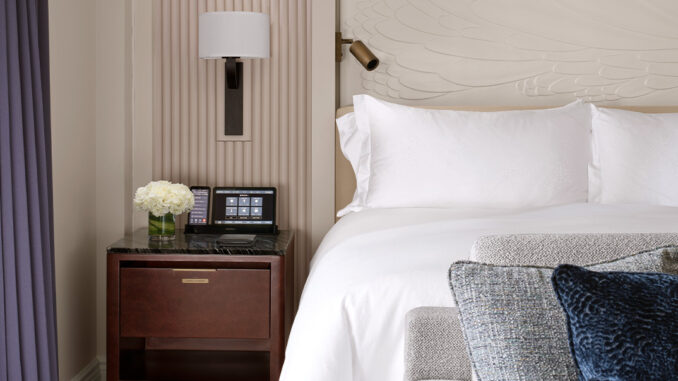
By Martin Green - 5.29.2025
In luxury hospitality, tradition has always been the foundation of a strong brand. Historic architecture, storied service standards, and generational legacies are part of what makes luxury feel timeless. But today’s guests want more than legacy—they want relevance, personalization, and tech-enabled convenience.
Across the industry, luxury hotels are undergoing a brand strategy transformation. They’re not abandoning their heritage—instead, they’re amplifying it using smart, digital tools that enrich the guest experience. From AI-driven personalization to immersive brand storytelling, technology is helping luxury hotels stay relevant without losing their soul.
This intersection of heritage and innovation is where the future of luxury lies—and it’s shaping how leading hotels think, operate, and market themselves in a digital-first world.
Heritage as a differentiator in the digital age
For many luxury hotels, history is a competitive advantage. But in a marketplace where guest expectations are shaped by platforms like Amazon, Netflix, and Airbnb, legacy alone isn’t enough. Guests still care about the story behind the hotel—but they also want that story to come to life across every digital and physical touchpoint.
Today’s luxury travelers, especially younger guests, are highly values-driven. They want to understand what a brand stands for, not just what it looks like. They’re asking: Is this hotel authentic? Is it relevant? Does it reflect who I am?
To answer that, hoteliers are using digital tools to express heritage in new ways—through immersive websites, behind-the-scenes video content, virtual tours, mobile storytelling apps, and interactive guest profiles. These tools make tradition accessible, not outdated.
Personalized luxury, powered by data
Personalization is no longer a premium—it’s an expectation. And in luxury, it must be executed with subtlety and care. Technology now plays a crucial role in helping hotels deliver bespoke experiences at scale, without sacrificing the personal touch.
Modern CRM platforms and guest experience management systems allow hotels to capture and use data in smarter ways. From remembering a guest’s preferred pillow firmness or wine vintage to tailoring in-room music and lighting, luxury hotels are using AI to anticipate needs before a guest even asks.
But personalization in luxury isn’t just about algorithms—it’s about discernment. The best luxury brands know when to act on data and when to let instinct and empathy lead the way.
Digital touchpoints that reflect the brand
Guests often experience a hotel brand long before they arrive—through search results, social media, review sites, and booking engines. This means every digital interaction must reflect the tone, quality, and aesthetic of the brand.
Forward-thinking luxury hotels are investing in:
- Custom mobile apps that reflect the property’s identity, not just functionality
- Direct booking portals with curated design, storytelling, and exclusive content
- Social media strategies that showcase culture, not just offers
- Guest messaging tools that match the brand’s service tone—whether formal, friendly, or relaxed
Done well, each of these touchpoints becomes part of the brand experience, reinforcing trust and emotional connection long before check-in.
Blending in-room tech with timeless hospitality
One of the biggest challenges for luxury hotels is integrating in-room technology without disrupting the sense of sanctuary. Guests still want warm welcomes, beautifully designed spaces, and human interaction—but they also expect intuitive controls, fast connectivity, and seamless functionality.
This is why many high-end hotels are adopting tech that blends into the background. Examples include:
- Voice-activated room controls for lighting, curtains, and temperature
- Smart mirrors with personalized welcome messages
- Streaming access built into the in-room experience
- Tablets that offer room service, spa bookings, and curated city guides
The goal isn’t to dazzle with gadgets—it’s to elevate convenience, reduce friction, and give guests more control, all while preserving the calm and elegance that define luxury.
Rethinking brand strategy with digital at the core
Traditionally, luxury branding has focused on image, location, and legacy. But today, the most successful brands are those that think strategically about how technology supports every aspect of the guest journey—from discovery and booking to post-stay engagement.
Luxury hotels are now building brand strategy with these core questions in mind:
- How do we express our heritage through digital media?
- What guest data matters—and how do we use it responsibly?
- Which tech tools can help us differentiate our experience?
- How can we create a consistent brand across offline and online touchpoints?
- How do we ensure our teams understand the tech behind the service?
These questions aren’t just for the marketing team—they’re becoming essential to executive leadership, operations, and guest experience roles alike.
Preparing future leaders to bridge tradition and innovation
As luxury hotel brands modernize, they need talent who understand both tradition and transformation. This is where education plays a pivotal role—particularly at leading luxury management schools. The next generation of hospitality leaders must be just as comfortable navigating CRM systems and digital guest journeys as they are curating brand storytelling and overseeing in-person service standards.
Today’s brand strategists in luxury hospitality are expected to think beyond image and aesthetics. They need a strong grasp of digital marketing, guest psychology, innovation management, and data ethics. The ability to lead multidisciplinary teams, interpret customer behavior across channels, and apply insights to elevate brand value is now essential.
Whether coming from within the industry or adjacent sectors like design, fashion, or tech, professionals who can bridge emotional storytelling with analytical thinking will be in high demand as luxury hospitality continues to evolve.
Case studies: luxury hotels leading the way
Several luxury hotel brands are already excelling at this blend of heritage and innovation:
The Peninsula Hotels
Known for tradition and excellence, Peninsula has embraced in-room technology that reflects its brand: understated, intuitive, and quietly luxurious. Guests can control everything from entertainment to concierge access via personalized tablets—available in multiple languages and tailored to the guest’s preferences.
Rosewood Hotels & Resorts
Rosewood uses data to deliver a “relationship hospitality” model, where every touchpoint feels curated. Their app allows guests to manage their stay while reflecting the brand’s refined, residential-style approach.
Six Senses
Rooted in wellness and sustainability, Six Senses uses storytelling and digital experiences to highlight their values—without over-commercializing. From smart room tech to immersive sustainability journeys via app, their tech reflects their ethos.
The future of luxury hospitality will be defined by those who can honor their brand’s legacy while embracing the tools that make service more meaningful, efficient, and emotionally intelligent. Technology, when used strategically, isn’t the enemy of tradition—it’s its next evolution.
As luxury hotels reimagine what their brands stand for in a connected world, one thing remains clear: elegance and innovation are no longer opposites. They’re essential partners in crafting the kind of brand experiences guests won’t just remember—but will actively seek out again and again.
 Martin Green is a career journalist who currently edits The Insider magazine for Glion Institute of Higher Education. He has previously covered industries as diverse as retail, investment banking and oil & gas, but for the past six years his focus has been on luxury and hospitality.
Martin Green is a career journalist who currently edits The Insider magazine for Glion Institute of Higher Education. He has previously covered industries as diverse as retail, investment banking and oil & gas, but for the past six years his focus has been on luxury and hospitality.
Are you an industry thought leader with a point of view on hotel technology that you would like to share with our readers? If so, we invite you to review our editorial guidelines and submit your article for publishing consideration.
